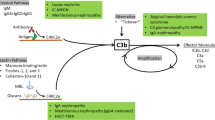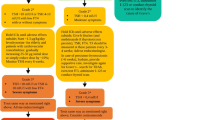The content of the soluble ligand of the immune checkpoint receptor (sPD-L1) was determined in the blood serum of 106 patients with renal cell carcinoma and 11 patients with benign kidney tumors by direct ELISA (Human sPD-L1 Platinum ELISA; Affimetrix, eBioscience). The control group included 19 healthy men and 18 women. Serum level of sPD-L1 significantly surpassed the control values in both patients with primary renal cancer (p<0.0001) and in patients examined during disease progression (p<0.05). In patients with benign kidney tumors, the level of this marker was significantly higher than in the control (p<0.05), but lower than in patients with renal cell carcinoma. The sPD-L1 level significantly increased with disease stage (p<0.001); it was higher in the presence of metastases in regional lymph nodes irrespective of their number (N1 or N2) than in the absence of metastases (N0); it was also increased in patients with distant metastases (M1) and patients with grade III-IV tumors in comparison with grade III-IV tumors (p<0.05). The highest sPD-L1 levels were recorded in patients with tumor size corresponding to T2 and T3 and decreased in patients with T4 tumors. Thus, sPD-L1 level in patients with renal cell carcinoma correlated with tumor grade and metastasizing and can be considered as a promising marker in monitoring of the effect of anti-PD1/PD-L1 therapy.
Similar content being viewed by others
References
Kushlinskii NE, Fridman MV, Morozov AA, Gershtein ES, Kadagidze ZG, Matveev VB. Modern approaches to kidney cancer immunotherapy. Onkourologiya. 2018;14(2):54-67. Russian.
Alessi C, Scapulatempo Neto C, Viana CR, Vazquez VL. PD-1/PD-L1 and VEGF-A/VEGF-C expression in lymph node microenvironment and association with melanoma metastasis and survival. Melanoma Res. 2017;27(6):565-572.
Chen Y, Wang Q, Shi B, Xu P, Hu Z, Bai L, Zhang X. Development of a sandwich ELISA for evaluating soluble PD-L1 (CD274) in human sera of different ages as well as supernatants of PD-L1+ cell lines. Cytokine. 2011;56(2):231-238.
Ding Y, Sun C, Li J, Hu L, Li M, Liu J, Pu L, Xiong S. The Prognostic significance of soluble programmed death ligand 1 expression in cancers: a systematic review and meta-analysis. Scand. J. Immunol. 2017;86(5):361-367.
Frigola X, Inman BA, Lohse CM, Krco CJ, Cheville JC, Thompson RH, Leibovich B, Blute ML, Dong H, Kwon ED. Identification of a soluble form of B7-H1 that retains immunosuppressive activity and is associated with aggressive renal cell carcinoma. Clin. Cancer Res. 2011;17(7):1915-1923.
Guo X, Wang J, Jin J, Chen H, Zhen Z, Jiang W, Lin T, Huang H, Xia Z, Sun X. High serum level of soluble programmed death ligand 1 is associated with a poor prognosis in Hodgkin lymphoma. Transl. Oncol. 2018;11(3):779-785.
Hamanishi J, Mandai M, Matsumura N, Abiko K, Baba T, Konishi I. PD-1/PD-L1 blockade in cancer treatment: perspectives and issues. Int. J. Clin. Oncol. 2016;21(3):462-473.
Huang X, Zhang W, Zhang Z, Shi D, Wu F, Zhong B, Shao Z. Prognostic value of programmed cell death 1 ligand-1 (PD-L1) or PD-1 expression in patients with osteosarcoma: a metaanalysis. J. Cancer. 2018;9(14):2525-2531.
Kim KS, Sekar RR, Patil D, Dimarco MA, Kissick HT, Bilen MA, Osunkoya AO, Master VA. Evaluation of programmed cell death protein 1 (PD-1) expression as a prognostic biomarker in patients with clear cell renal cell carcinoma. Oncoimmunology. 2018;7(4):e1413519. doi: https://doi.org/10.1080/2162402X.2017.1413519.
Massari F, Santoni M, Ciccarese C, Santini D, Alfieri S, Martignoni G, Brunelli M, Piva F, Berardi R, Montironi R, Porta C, Cascinu S, Tortora G. PD-1 blockade therapy in renal cell carcinoma: current studies and future promises. Cancer Treat. Rev. 2015;41(2):114-121.
Sacher AG, Gandhi L. Biomarkers for the clinical use of PD-1/PD-L1 inhibitors in non-small-cell lung cancer: a review. JAMA Oncol. 2016;2(9):1217-1222.
Theodoraki MN, Yerneni SS, Hoffmann TK, Gooding WE, Whiteside T.L. Clinical significance of PD-L1(+) exosomes in plasma of head and neck cancer patients. Clin. Cancer Res. 2018;24(4):896-905.
Topalian SL, Taube JM, Anders RA, Pardoll DM. Mechanismdriven biomarkers to guide immune checkpoint blockade in cancer therapy. Nat. Rev. Cancer. 2016;16(5):275-287.
Tsang JY, Au WL, Lo KY, Ni YB, Hlaing T, Hu J, Chan SK, Chan KF, Cheung SY, Tse GM. PD-L1 expression and tumor infiltrating PD-1+ lymphocytes associated with outcome in HER2+ breast cancer patients. Breast Cancer Res. Treat. 2017;162(1):19-30.
Zhu X, Lang J. Soluble PD-1 and PD-L1: predictive and prognostic significance in cancer. Oncotarget. 2017;8(57):97 671-97 682.
Author information
Authors and Affiliations
Corresponding author
Additional information
Translated from Byulleten’ Eksperimental’noi Biologii i Meditsiny, Vol. 166, No. 9, pp. 325-329, September, 2018
Rights and permissions
About this article
Cite this article
Kushlinskii, N.E., Gershtein, E.S., Morozov, A.A. et al. Soluble Ligand of the Immune Checkpoint Receptor (sPD-L1) in Blood Serum of Patients with Renal Cell Carcinoma. Bull Exp Biol Med 166, 353–357 (2019). https://doi.org/10.1007/s10517-019-04349-8
Received:
Published:
Issue Date:
DOI: https://doi.org/10.1007/s10517-019-04349-8




